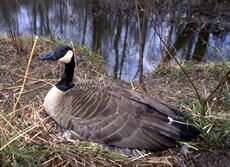Goose
|
|
Other uses: Goose (disambiguation)
| Geese | ||||||||||||
|---|---|---|---|---|---|---|---|---|---|---|---|---|
 A Canada Goose | ||||||||||||
| Scientific classification | ||||||||||||
| ||||||||||||
| Genera | ||||||||||||
Goose (plural geese) is the general English name for a considerable number of birds, belonging to the family Anatidae. This family also includes the swans, which are mostly larger than geese, and the ducks, which are smaller.
| Contents |
Introduction
This article deals with the true geese in the subfamily Anserinae. A number of other waterbirds, mainly related to the shelducks, have "goose" as part of their name.
True geese are medium to large birds, always (with the exception of the Néné) associated to a greater or lesser extent with water. Most species in Europe, Asia and North America are strongly migratory as wild birds, breeding in the far north and wintering much further south. However, escapes and introductions have led to resident feral populations of several species.
Geese have been domesticated for centuries. In the West, farmyard geese are descended from the greylag, but in Asia the swan goose has been farmed for at least as long.
All geese eat an exclusively vegetarian diet, and some can become pests when flocks feed on arable crops.
Geese tend to lay a smaller number of eggs than ducks. However, both parents protect the nest and young, which usually results in a higher survival rate for the young geese, known as goslings.
GeeseFlyingOxford20050326_CopyrightKaihsuTai.jpg
Goose_head.jpg
A group of geese on the ground is called a gaggle. When flying, a group of geese is known as a wedge or a skein. See List of collective nouns for birds
Goose species
True geese
The following are the true goose species.
Genus Anser, Grey Geese
- Greylag Goose Anser anser
- White-fronted Goose A. albifrons
- Lesser White-fronted Goose A. erythropus
- Bean Goose A. fabalis
- Pink-footed Goose A. brachyrhynchus
- Bar-headed Goose A. indicus
- Swan Goose, A. cygnoides
Genus Anser or Chen (depending on authority cited)
- Snow Goose Anser caerulescens or Chen caerulescens
- Ross's Goose, A. rossii or C. rossii
- Emperor Goose, A. canagicus or C. canagica
Genus Branta, Black Geese
- Brent Goose Branta bernicla
- Barnacle Goose B. leucopsis
- Canada Goose B. canadensis
- Red-breasted Goose B. ruficollis
- Néné or Hawaiian Goose, B. sandvicensis
Genus Cereopsis
- Cape Barren Goose, Cereopsis novaehollandiae
Other species called "geese"
There are a number of mainly southern hemisphere birds named as geese which are more correctly placed with the shelducks in the Tadorninae. These are:
- Andean Goose, Chloephaga melanoptera
- Upland Goose, Chloephaga picta
- Kelp Goose, Chloephaga hybrida
- Ashy-headed Goose, Chloephaga poliocephala
- Ruddy-headed Goose, Chloephaga rubidiceps
- Orinoco Goose, Neochen jubata
- Egyptian Goose, Alopochen aegyptiacus
The three perching ducks in the genus Nettapus are named as pygmy geese, such as the cotton pygmy goose, Nettapus javanica, but are true ducks.
The unusual magpie goose is in a family of its own, the Anseranatidae.
Etymology
Goose in its origins is one of the oldest words of the Indo-European languages, the modern names deriving from the proto-Indo-European root, ghans, hence Sanskrit hamsa (feminine hamsii), Latin anser, Greek khén etc.
In the Germanic languages, the root word led to Old English gos with the plural gés, German Gans and Old Norse gas. Other modern derivatives are Russian gus and Old Irish géiss.
In non-technical use, the male goose is called a "gander" (Anglo-Saxon gandra) and the female is the "goose".
Source: Webster's Revised Unabridged Dictionary (1913)
Geese in cooking
Geese can be roasted as a whole bird, though their size precludes this preparation except for banquets and other festive meals (such as on Christmas).
Geese are used for the production of foie gras.
Geese in fiction and myth
When Aphrodite first came ashore she was welcomed by the Charites (Roman "Graces"), whose chariot was drawn by geese.
There are Mother Goose tales, such as a farmwife might have told; there is the proverbial goose that laid the golden eggs, warning about the perils of greed. And there is the goose as a veiled reference to the penis in the verses
- Goosy Goosy Gander, where dost thou wander?
- Upstairs, downstairs, in my lady's chamber.
The geese in the temple of Juno on the Capitoline were said by Livy to have saved Rome from the Gauls around 390 BC when they were disturbed in a night attack. The story may be an attempt to explain the origin of the sacred flock of geese at Rome.
There is a tale of Trickster and the geese in the North American Trickster cycle [1] (http://hotcakencyclopedia.com/ho.Trickster&Geese.html).
Liliane Bodson and Daniel Marcolungo, L'oie de bon aloi: Aspects de l'histoire ancienne de l'oie domestique [The goose in ancient life and folklore]. Vise (Musée Regional d'Archeologie et d'Histoire de Vise), 1994, discusses the image and lore of domestic geese in classical antiquity, with a separate chapter on the goose in folklore.
There is a Christian reference (Father Augustine) to the goose that relates to the coming of the winter solstice or as it is called "The Great Freezing". One of the reasons for harsh winter seasons was to scare or cull the goose population (a creation of the devil). This cyclical process is supposed to be symbolic of the struggle between evil(Satan) and God. Evil may never be completely put down, but God shall always triumph.
See also:
eo:Anserina subfamilio fr:Oie ja:雁 ja:ガチョウ nds:Gans nl:Gans pl:Gęsi pt:Ganso sr:Гуска zh:鹅 he:אווז
Categories: Anserinae | Anser | Geese | Heraldic birds | Poultry
